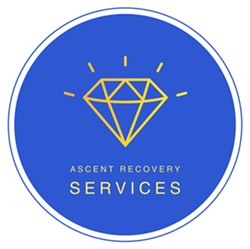Charlie Jackson has been in the mental health and addiction recovery field since 2009. Jackson's first job was in rehab for substance abuse disorders.
His experience in the field extends to his personal struggle with addiction and chronic relapse until he successfully became sober at the age of 20.
He said he "practically grew up in and out of rehabs and programs." What he took away from the experience was the importance of advocating for a person in need who is actively seeking help.
"That's the inspiration to me, is to always advocate for the client," Jackson said.

- Image Courtesy Of Charlie Jackson
- HERE Charlie Jackson is bringing his passion project to life by assisting individuals through their addiction recovery journey as a hands-on coach.
It's one of the main reasons why Jackson is now pursuing his own business to establish a new resource for those looking for help. He's the chief executive officer of Ascent Recovery Services, which provides coaching services that aim to help a client pave their road to recovery on the Central Coast.
He said that the critical periods for recovery are in the first weeks and/or months that follow abstinence from a substance or at the end of residential treatment. Ascent Recovery Services stays with the client during those periods to ensure that they're maintaining their commitment to recovery.
Jackson provides services that include setting short-term and long-term goals; weekly 30 minute check-ins in person, via Zoom, or over the phone; random drug tests; interventions; referrals; and help seeking placement services. Ascent Recovery isn't licensed to provide therapy or psychiatric services.
"If for example someone goes to the hospital to detox, is given [intravenous therapy (IV)] to hydrate, and is given the OK to go home, we're there with them for 24 hours. We work with their providers, monitor them, and provide them with any support that they may need," he said.
When Jackson first moved to San Luis Obispo County in 2017, he worked at one of the local hospitals as part of the outpatient case management and group facilitation team. He said he spoke with people every day who were enduring unique situations, such as drinking two bottles of vodka a day.
His job was to call their insurance provider and advocate on behalf of the client, explaining why he or she needed certain services. Jackson found that many clients who desperately needed certain services had insurance that didn't cover them and that the services offered in the county were limited. The other issue he found was clients getting let out of treatment early due to insurance criteria.
"As a result, we're seeing a ton of people that aren't stabilized," Jackson said.
He points to SLO Health Counts, which studied the age-adjusted death rate due to drug use. The most recent data, from 2016 to 2018, shows 16.6 deaths per 100,000 people—down from 2015 to 2017, which had a rate of 17.5. However, from 2012 to 2017 the rate steadily increased.
New Times previously reported that between 2016 and 2020, the SLO County coroner's cases of overdose deaths show an increase in those caused by fentanyl or an opiate that contained fentanyl.
"I want to be the net that catches those people because there's nothing for them," Jackson said.
Fast fact
• The DeGroot Youth Activities Endowment Fund created by Kimberly's Global Real Estate Corporation recently donated $9,000 to the San Luis Coastal Education Foundation School Closure Impact Fund to provide bikes for kids. The School Closure Impact Fund aims to help the district's most vulnerable families disproportionately impacted by the COVID-19 pandemic's economic disruption. This funding will help students who are lacking transportation options and would benefit from having a bike to help them get to school. San Luis Coastal Education Foundation Executive Director Christine Robertson said as soon as children started returning to school, COVID-19 protocols created some transportation challenges due to space requirements on school and city buses. Robertson estimated about 20 to 30 students were in need of alternative transportation, and the sponsorship from DeGroot will provide them with a free bike, helmet, chain, lock, and bike light. To learn more about the endowment fund or how to contribute visit, kimberlysre.com/dyaef.html. Δ
Staff writer Karen Garcia wrote this week's strokes and plugs. Send tidbits to [email protected].
Comments